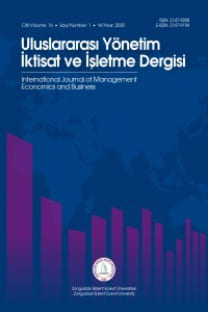DETERMINANTS OF IMPULSIVE BUYING BEHAVIOUR AND A MODEL PROPOSAL
impulsive buying, conscientiousness, social media, hedonic consumption, structural equation modelling
A STUDY ON IMPULSIVE BUYING BEHAVIOUR
impulsive buying, conscientiousness, social media, hedonic consumption, structural equation modelling,
___
- Akçay, G. & Özdemir, E. (2019). Demografik özellikler açısından tüketicilerin plansız satın alma davranış farklılıklarını incelemeye yönelik bir araştırma. Uluslararası Toplum Araştırmaları Dergisi, 14(20), 817-846.
- Al-Zyoud, M. F. (2018). Does social media marketing enhance impulsive purchasing among female customers case study of Jordanian female shoppers. Journal of Business and Retail Management Research, 13(2), 135–151.
- Aragoncillo, L. & Orus, C. (2018). Impulsive buying behaviour: an online- offline comparative and the impact of social media. Spanish Journal of Marketing-ESIC, 22(1), 42-62.
- Aytekin P. & Ay C. (2015). Hedonik tüketim ve anlık satın alma ilişkisi. Niğde Üniversitesi İktisadi ve İdari Bilimler Fakültesi Dergisi, 8 (1), 141-156.
- Babin, B. J., Darden, W. R. & Griffin, M. (1994). Work and/or fun: Measuring hedonic and utilitarian shopping value. Journal of Consumer Research, 20(4), 644–656.
- Badgaiyan, A. J., Verma, A. & Dixit, S. (2016). Impulsive buying tendency: Measuring important relationships with a new perspective and an indigenous scale. IIMB Management Review, 28(4), 186-199.
- Bryne, B. M. (2010). Structural equation modelling with AMOS: Basic Concepts, Applications, and Programming. New York: Routledge.
- Chang, H.J., Eckman, M. & Yan, R. N. (2011). Application of the stimulus-organism-response model to the retail environment: the role of hedonic motivation in impulsive buying behaviour. The International Review of Retail, Distribution and Consumer Research, 21(3), 233- 249.
- Chen, Y., Lu, Y., Wang, B. & Pan, Z. (2019). How do product recommendations affect impulsive buying? An empirical study on WeChat social commerce. Information & Management, 56(2), 236-248.
- Farid, D. S. & Ali, M. (2018). Effects of personality on impulsive buying behaviour: Evidence from a developing country. MPRA Paper No. 87401, Retrieved from https://mpra.ub.uni-muenchen.de/87401/.
- Giraud, M. (2001). Les acheteurs impulsifs: Proposition d'une typologie. Decisions Marketing, 24 (Sept.-Dec.), 17-24.
- Hausman, A. (2000). A multi-method investigation of consumer motivations in impulsive buying behaviour. Journal of Consumer Marketing, 17(5), 403-419.
- Khokhar, A. A., Qureshi, P.A., Murtaza, F. & Kazi A.G. (2019). The Impact of Social Media on impulsive Buying Behaviour in Hyderabad Sindh Pakistan. International Journal of Entrepreneurial Research (IJER) 2(2); 8-12.
- Kollat, D. T. & Willett, R. P. (1967). Customer impulsive purchasing behaviour. Journal of Marketing Research, 4(1), 21-31.
- Kurt, S. (2019). Yapısal eşitlik modeli ve dürtüsel satın alma davranışı üzerine bir çalışma, Y.Lisans Tezi, Gazi Üniversitesi.
- Meydan, C. H. & Şeşen, H. (2011). Yapısal eşitlik modellemesi amos uygulamaları. Ankara: Detay Yayıncılık.
- Rook, D. W. & Fisher R. J. (1995). Normative influences on impulsive buying behaviour, Journal of Consumer Research, 22(3), 305-313.
- Semiz, B. B. (2017). A ve B tipi kişilik özelliklerine göre tüketicilerin plansız, kompülsif ve hedonik satın alma davranışlarının araştırılması. Pazarlama İçgörüsü Üzerine Çalışmalar, 1(1/2), 13-22.
- Sudha, S. and Bharathi, K. (2018). Role of social media influence on customers impulsive buying behaviour towards apparel. International Journal of Supply Chain Management, 7(5), 903-908.
- Şahin, A. & Fırat, A. (2018). The Effect of Social Media On Hedonic Consumption of Individuals. Turkish Journal of Marketing, 3(2), 127-142.
- Tifferet, S. & Herstein, R. (2012). Gender differences in brand commitment, impulsive buying, and hedonic consumption. Journal of Product & Brand Management, 21(3), 176–182.
- Tulungen, C.E. (2013). Comparative analysis of impulsive buying based on gender differences. Jurnal EMBA, 1(4), 1349-1357. Uca, N. (2016).
- Ülkelerin yolsuzluk algısının, lojistik performansının, dış ticaret hacminin ve küresel rekabet ilişkisinin yapısal eşitlik modeli ile incelenmesi: kavramsal model önerisi. Doktora Tezi, Maltepe Üniversitesi, Sosyal Bilimler Enstitüsü.
- Verplanken, B., Herabadi, A. G., Perry, J. A., & Silvera, D. H. (2005). Consumer style and health: The role of impulsive buying in unhealthy eating. Psychology & Health, 20(4), 429-441.
- Yu, C. & Bastin, M. (2010). Hedonic shopping value and impulsive buying behaviour in transitional economies: A symbiosis in the Mainland China marketplace. Journal of Brand Management, 18(2), 105-114.
- ISSN: 2147-9208
- Yayın Aralığı: 4
- Başlangıç: 2005
- Yayıncı: Zonguldak Bülent Ecevit Üniversitesi
YENİ TÜKETİCİLER OLARAK DİJİTAL YERLİLER: Z KUŞAĞINDA ROL MODELİN DAVRANIŞSAL NİYETE ETKİSİ
Yesevi Alperen YASA, Ahmet Salim KUŞ, Nilay SAYAN
ÖRGÜTSEL DEMOKRASİ’NİN ÖRGÜTSEL PERFORMANSA ETKİSİNDE ÖRGÜTSEL SESLİLİĞİN ARACI ROLÜ: VİYANA ÖRNEĞİ
MAKİNE ÖĞRENME ALGORİTMALARIYLA SAHTEKÂRLIK ALGILAMA: BİR MOBİL ÖDEME SİSTEMİ ÇALIŞMASI
DETERMINANTS OF IMPULSIVE BUYING BEHAVIOUR AND A MODEL PROPOSAL
Samet KURT, Filiz KARDİYEN, Mehmet Akif BAKIR
TÜKETİCİLERİN KAFE VE LOKANTA TERCİHLERİNİN BELİRLENMESİNE YÖNELİK BİR UYGULAMA
Nu Khanh Tram TON, Hatice Dilara KESKİN, Arzu KALIN
Neslihan CAVLAK, Murat Selim SELVİ
E7 ÜLKELERİNDE YENİLENEBİLİR ENERJİ TÜKETİMİ VE EKONOMİK BÜYÜME İLİŞKİSİNİN İNCELENMESİ
TÜRKİYE’DE COVID-19 PANDEMİ DÖNEMİNDE GİRİŞİMLERE YAPILAN YATIRIMLARIN ANALİZİ
